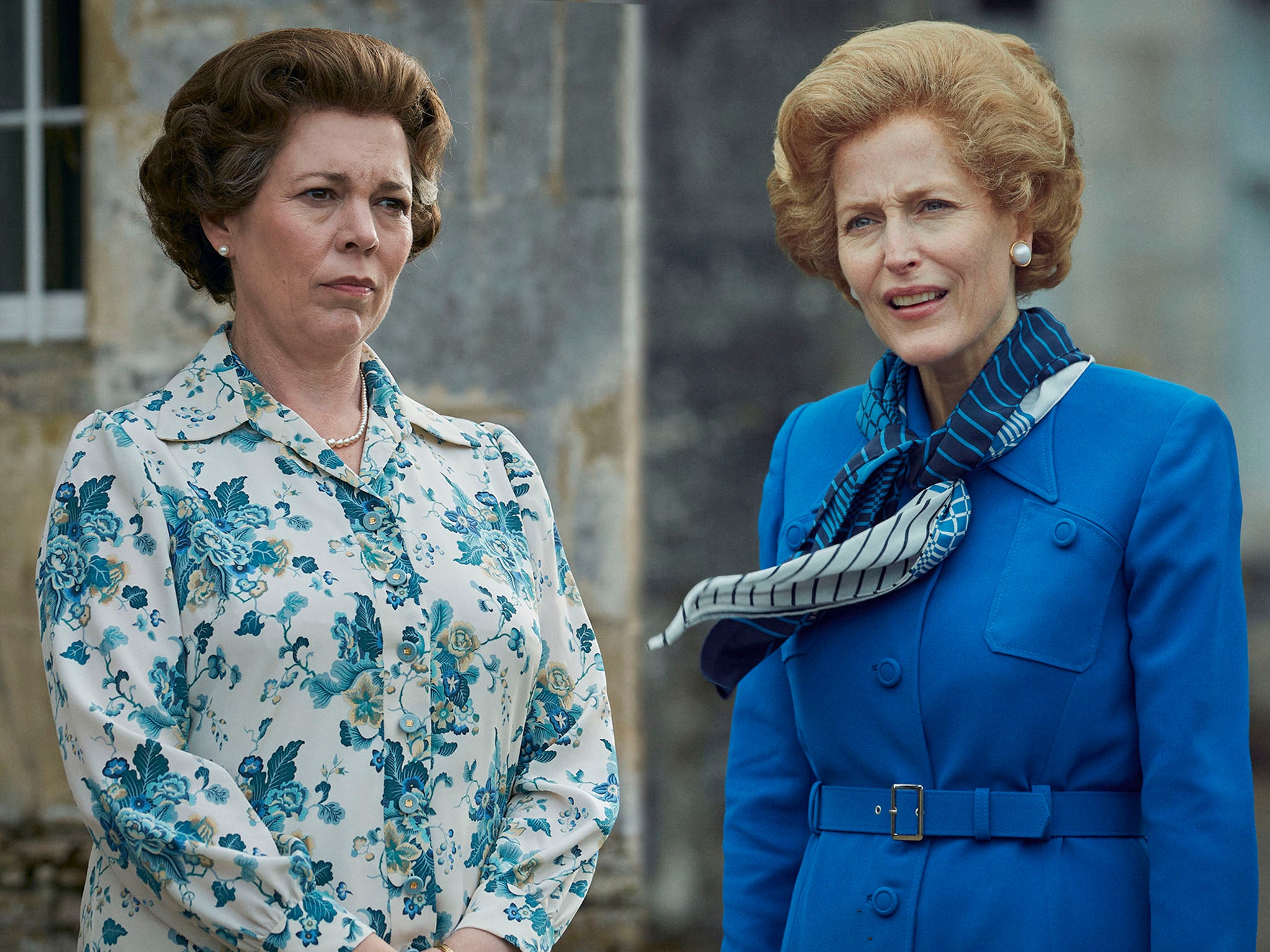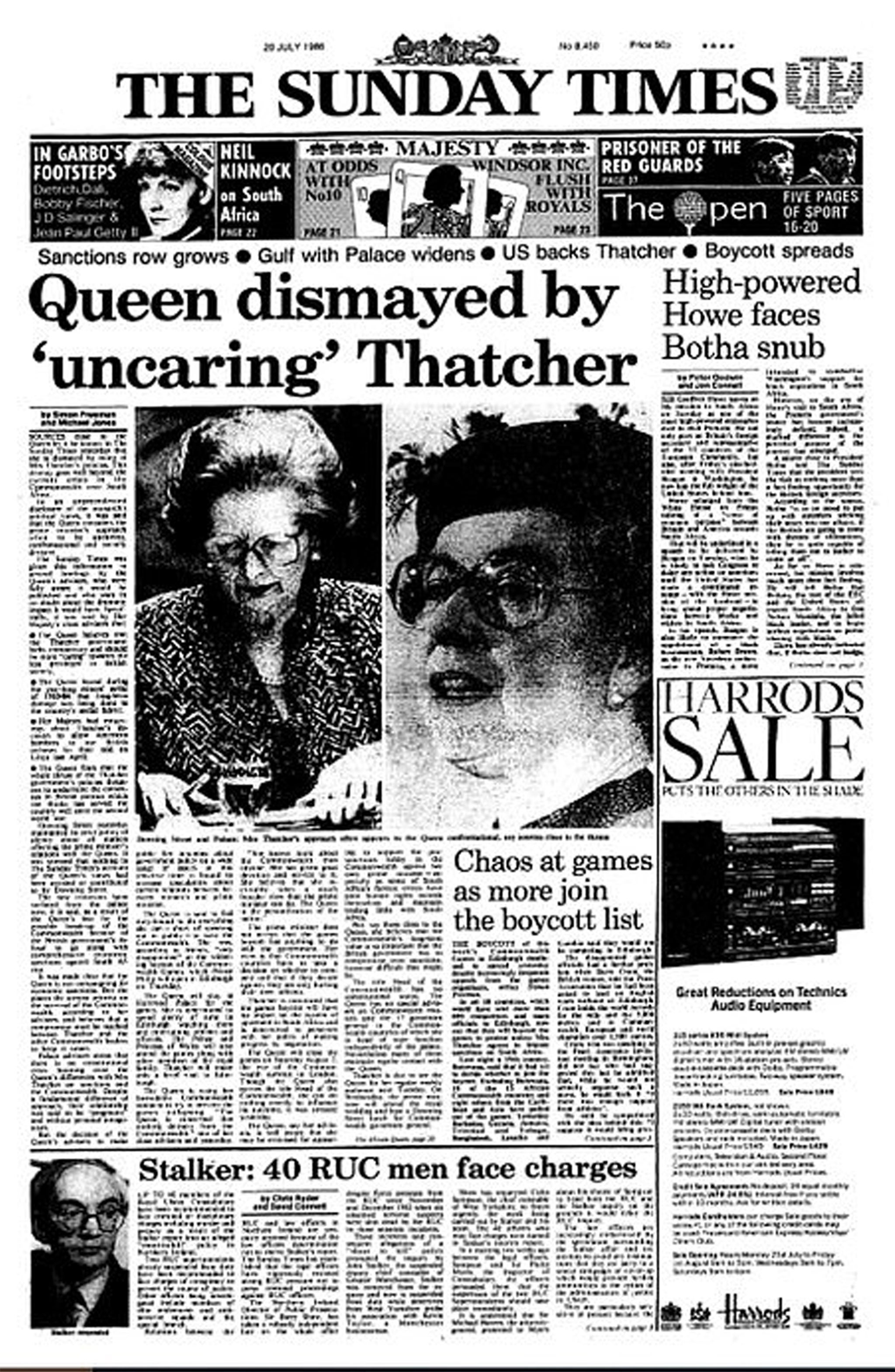The Crown is as accurate as a drama can be about Thatcher and the Queen
David Lister was at The Sunday Times during the tensions between Mrs Thatcher and the Queen, and, he writes, The Crown is fairly accurate on this topic


Before joining The Independent for its launch in the autumn of 1986, I was on the news desk of the Sunday Times. I have been reminded of that period by the current series of The Crown, detailing as it does the tension between The Queen and the then prime minister, Margaret Thatcher.
In episode eight, the Sunday Times breaks the story about this tension in July of that year, with the front-page headline “Queen dismayed by ‘uncaring’ Thatcher”. And there is a scene when the palace’s press officer Michael Shea is told by one of his underlings that Simon Freeman from the Sunday Times had been repeatedly calling.
Yes, I remember Simon. He was a first-class investigative reporter, one half of the paper’s investigative team for a long time with the older reporter Barrie Penrose. Where Penrose was middle-aged, scrupulously correct, affable, polite and old school, Freeman was a different sort of journalist, a young buck, great company and a bit of a chancer, all perfect attributes for an investigative reporter. The Penrose-Freeman partnership was disbanding at the time of this front-page story, and the byline on it was shared between Freeman and the political editor, Michael Jones.
The then Sunday Times editor, Andrew Neil, who wrote that famous headline, also has a bit part in The Crown, one of the bittiest bit parts in the history of TV drama. He is a disembodied Scottish voice on the end of the telephone line, with Michael Shea pictured on his end of the call, expressing his anger about the story. “Oh, spare me your indignation,” responds Neil. I can attest that in giving Neil a succinct, decisive and direct riposte, the scriptwriter Peter Morgan captured the inimitable style of the Sunday Times editor at that time.
But was this massively agenda-setting scoop nearly not a front-page story at all? I attended the editorial conference chaired by Andrew Neil, when the story was offered. It was offered by the features editor as the main feature for the coming Sunday. I recall Andrew interrupting immediately and saying: “That’s the splash!”
That was one of a number of occasions when I was able to witness what a fine, instinctive journalist he was. Certainly, he had his detractors, both then and in his later career at the BBC. But for me, his sure, journalistic touch was never in doubt in either of those careers, and it was mighty foolish of the BBC to lose him.

The story in the Sunday Times said memorably that the weekly meetings between the Queen and Margaret Thatcher were dreaded by at least one of them. I never discovered which one that referred to. But as The Crown implies, it could well have been both of them.
What did emerge from that editorial conference and discussions around the Sunday Times office at the time, and what the story did reveal, was that there were two distinctive causes of tension between the two women. The first was the refusal of Thatcher to impose sanctions on the apartheid government of South Africa. The rest of the Commonwealth wanted sanctions, and the Commonwealth, as we know, was and is very dear to the Queen’s heart. She was particularly upset that that same month the Commonwealth Games held in Edinburgh had been boycotted by 32 Commonwealth nations.
The second was a longer-term concern for the Queen, namely that she felt the PM was lacking compassion. The 1984-85 miners’ strike had disturbed her. And this we know from a small but significant, and now largely forgotten incident. The Queen at the time of the strike was being shown round The Times (the daily not Sunday paper) newsroom, and the paper’s labour reporter, Paul Routledge, cheekily broke all convention and asked her what she felt about it.
The Queen does not “do”; interviews and Routledge certainly raised eyebrows at the time, and not just among palace staff. In fact, he was presented to the Queen and had a private conversation with her, which he then leaked to another reporter. But what is significant is that he did get a response from the Queen. Even more significant was what she said. She said that as she understood it, the dispute was down to one man. She also said the strike was “very sad”. Routledge then put her straight from his point of view on it being about one man, giving her the miners’ perspective. But the Queen had volunteered that the dispute was “very sad”, a view unlikely to have been expressed by Thatcher.
Of course, under the circumstances, stories of clashes between ‘two powerful women’ were just too good not to make up
It was all part of the growing differences between the two women, which came to the fore in that Sunday Times story. As Andrew Neil recalled, writing about in the Sunday Times (as a guest writer) recently, “We revealed that the rift between the palace and No 10 went far beyond South African sanctions. The royal family thought Thatcher ‘uncaring, confrontational and socially divisive’. The Queen feared her prime minister’s tough stance against the miners’ strikes was damaging ‘the country’s social fabric’. She had ‘misgivings’ about allowing US bombers to use Britain as a base from which to strike Libya; and she wanted the government to be more ‘caring’ towards the less privileged.”
In other words, The Crown, much criticised for playing fast and loose with the truth, did on this subject get it broadly right. And so did the Sunday Times, not surprisingly as its source was Michael Shea, the Queen’s press spokesperson. Neil confirms this, though he is unconvinced that, as implied by The Crown, the Queen encouraged the leaking. Michael Shea was forced to resign over the leak, even though other senior palace officials encouraged him, and Neil suggests that he had the support of other members of the royal family, including Prince Charles. As for Thatcher, she was said to be “hurt” by the story, but her relationship with the Queen continued to be a respectful one, not the hectoring and abrasive one that Peter Morgan suggests in The Crown. And she was later made a Lady Companion of the Garter and given the Order of Merit by the Queen.
Long after she had ceased to be prime minister, Thatcher reflected on her relationship with the Queen in a televised interview, saying: “The Queen takes an intense interest in every aspect of life in our country and she brings to bear a formidable grasp of current issues and tremendous breadth of experience. Her guidance and advice are most acute, and as prime minister I was privileged to benefit from both enormously … She is truly an inspiration and an example for the whole nation. Long may she rule”
And in the first chapter of her autobiography, Thatcher states: “Although the press could not resist the temptation to suggest disputes between the palace and Downing Street, especially on Commonwealth affairs, I always found the Queen’s attitude towards the work of the government absolutely correct. Of course, under the circumstances, stories of clashes between ‘two powerful women’ were just too good not to make up. In general, more nonsense was written about the so-called ‘feminine factor’ during my time in office than about almost anything else.”
But here Thatcher was being a little economical with the truth. The differences of opinion between the two women were not made up. Michael Shea’s leak, his resignation and the detailed Sunday Times story were evidence of that.
He says that he may on occasion have sacrificed accuracy, but only in the quest to portray deeper truth
It is not just The Crown which turned that fraught relationship and the story that revealed it into drama. The 2013 West End stage play, The Audience, also needless to say by Peter Morgan, starred Helen Mirren as the Queen, and revolved round those weekly audiences the Queen had with her prime ministers from Churchill onwards. The scene between the Queen and Thatcher following the Sunday Times story has virtually identical dialogue to the scene in The Crown. Presumably TV critics don’t go to the theatre that much, or more might have been made of this fact.
We will have to wait for the next series of The Crown to see what the drama makes of the Queen’s relationship with Tony Blair. But we can have a pretty good idea as the film The Queen, also scripted by Morgan, and also starring Helen Mirren, with Michael Sheen as Blair and Helen McCrory as Cherie, was set in the aftermath of Princess Diana’s death, and showed a cordial relationship, though the Queen seemed amused by his love of informality and Cherie’s disinclination to curtsey.
In reality, she may have been less amused. It’s said that the disinclination to curtsey is founded in fact, and the Queen was unimpressed by any invitation to “call me Tony”.
What rankled far more was Blair’s opposition to country sports and desire to legislate against fox-hunting. The queen was famously an enthusiast for country sports. Blair is also said to have unilaterally cancelled the weekly audience occasionally, which would also have rankled, and on one occasion referred to “my armed forces”, when the armed forces, of course, owe their allegiance to the Queen.
If The Crown’s portrayal of the Sunday Times furore brought back memories for me, so did the pressure on Charles to get married in an earlier episode. As an education journalist, I was present at the National Association of Headteachers’ annual conference a year or so before the Prince of Wales’s marriage to Diana. Prince Charles was the guest of honour at the conference dinner and made the main speech. After saying some words about education, he suddenly went off piste and said: “People say I need a wife. And I do.”
The press pack around me, reconciled to have to listen to and reproduce thoughts on schools and the environment, couldn’t believe their ears. Sure enough, the headline the next day was: “Charles: ‘I need a wife’.”
The annual dinner of the National Association of Headteachers didn’t make the cut in The Crown. A pity actually, because, as I recall, Prince Charles cut quite an impressive figure on the dance floor as he whirled one of the leading NAHT ladies around the floor.
But credit to Peter Morgan for what he has included. He says that he may on occasion have sacrificed accuracy, but only in the quest to portray deeper truth. Certainly, in depicting one of the key themes of the current series – the tensions between the two most powerful women in the land – he would seem to have been as accurate as any drama can hope to be.




Join our commenting forum
Join thought-provoking conversations, follow other Independent readers and see their replies
Comments